|
French people love to go to parks to relax, read books and enjoy the peace in the heart of the city. (Photo: MINH DUY) |
The popularity of remote work
Remote working solutions have marked one of the most profound changes in working life in France in particular and globally in general, especially 5 years after the Covid-19 pandemic. It is not an exaggeration to say that this pandemic has permanently changed the way professional activities are organized. Remote working has gradually become an indispensable part of working life in this European country .
According to data from the French National Institute of Statistics and Economic Studies (INSEE), published in March 2024, about one-fifth of private sector employees (22.4%) chose to work remotely in the second quarter of 2024.
While this figure has increased from less than 1% through agreements proactively proposed by businesses to employees in 2017 to 4% in 2022, the reality shows that the labor market has gradually accepted this new form of work.
Audrey Richard, President of the French National Association of Human Resources Directors (ANDRH), also acknowledged the feasibility of remote working. Many workers believe that remote working helps avoid tiring hours of travel and allows them to work in a more comfortable environment, even in the peaceful countryside.
However, others also admit that balancing work and family life in a tight space causes a lot of stress, especially for mothers.
|
To avoid feeling uncomfortable staying too long in a small space, many people choose to work outdoors in parks, public gardens... (Photo: MINH DUY) |
However, a full return to pre-pandemic office work is unlikely in France. Many companies have been forced to adapt and move to a hybrid model, allowing employees to work remotely two days a week. According to the Association of Business Leaders (APEC), 82% of CEOs support remote work.
Even solutions that require employees to return to the office have met with strong resistance, a typical example of which is clearly seen at the video game company Ubisoft. According to estimates from the Video Game Workers’ Union (STJV), the strike at Ubisoft in October 2024 attracted the participation of more than 700 of the technology company’s 4,000 employees.
Also according to APEC , this year, 17% of businesses want to review the terms and conditions of remote working, citing the “desire to enhance the sense of attachment to the company”. Remote working can reduce interaction between colleagues, affecting team spirit and cohesion.
Additionally, when employees work in multiple locations, it can become more difficult to build and maintain a strong company culture. Furthermore, some remote workers experience mental health issues as they feel isolated from their professional activities in the office.
However, many new solutions to reconcile the interests of the company and the wishes of the employees have also been proposed, such as: Increasing the number of days in a week working directly at the office, regularly organizing collective activities, company events or team building activities, increasing investment in communication tools and platforms for working remotely and in the office.
Dramatic changes in consumer habits
The outbreak of the pandemic has created an unprecedented change in French consumer behavior. Online shopping has become a powerful catalyst, promoting the transition from traditional retail channels to online platforms.
About 55% of French people admit that their shopping habits have changed significantly since the pandemic broke out, with a marked increase in online shopping activities, Le Monde newspaper reported.
The online sales market in France reached 110.4 billion euros in 2020, soaring to 175.3 billion euros in 2024. If this trend continues, this figure could reach more than 200 billion euros by 2026.
In the apparel sector alone, online shopping will account for 23% of sales by 2024, up significantly from the 15% recorded in 2019.
The surge in online shopping has also led to a surge in online payments. The number of card transactions on mobile technology devices in 2024 has increased significantly, reaching a 90% increase compared to 2023.
In many Western countries, including France, there exists a form of shopping called “drive-through”, which allows busy customers or those who do not want to waste time finding a parking space to buy products or services without having to get out of their cars.
Every transaction, from ordering, paying to receiving goods, is done right at the car, attracting a large number of new customers, especially the elderly, who may have previously been hesitant about online shopping.
Similarly, home delivery services have also received customer trust, showing the adaptability and flexibility of businesses in meeting market needs.
|
Restaurants and shops on the streets of Paris have been "silent" for a long time as people tightened their spending after the pandemic. (Photo: MINH DUY) |
In the overall shopping landscape, it seems that the dark side belongs to traditional retail channels. City centre stores have been hit hard, with the number of store closures increasing.
Some well-known brands such as Camaïeu and San Marina Shoes have struggled or been forced to close. The luxury department store chain Galeries Lafayette has decided to close two branches in the southern French city of Marseille.
Many households are still cautious about shopping, preferring to buy discounted items from discount supermarkets or second-hand platforms. In the beauty sector alone, French women are visiting hair salons less often, with a frequency of 3.8 visits per quarter compared to 4.7 in 2019.
Despite tight budgets, the French are still spending on physical activity, with 55% saying they engage in physical activity at least once a week, up from less than 50% previously. Running, cycling and fitness have attracted more people, and gym chains have continued to expand their facilities.
The recovery of air transport
The Covid-19 pandemic has caused serious losses to the entire transport industry, from road, rail, to sea, but the most heavily affected industry is the aviation industry.
Air transport operators have fallen into a severe financial crisis. However, after four challenging years, the transport industry, especially air transport, is gradually recovering with positive and strong growth signals.
|
The number of passengers departing internationally, traveling to France or transiting through France by air has increased significantly over the past five years. (Photo: MINH DUY) |
According to an article in the newspaper FranceInfo on January 30, 2025, citing data published by the International Air Transport Association (IATA): Traffic volume increased by 10.4% in 2024. Globally, the number of air passengers in 2024 is forecast to reach 4.89 billion, an increase of 3.8% compared to 2019.
Figures from the French General Directorate of Civil Aviation (DGAC) show that in 2024, the number of passengers will reach 178 million in France, equivalent to 99.1% of the 2019 level.
In the summer of 2024, French national airline Air France reached an important milestone when passenger numbers returned to pre-crisis levels in 2019.
However, the road to recovery for the aviation industry remains rocky. Although passenger traffic has rebounded, the aviation supply chain is still struggling to regain its footing.
Small and medium-sized air cargo providers, which have already cut their workforces during the pandemic, are now struggling to recruit qualified engineers and technicians.
Supply chain disruptions are slowing aircraft deliveries and parts deliveries, affecting airlines’ growth plans. However, experts also predict that Airbus and Boeing’s mid-range aircraft production will return to 2019 levels by 2026.
|
Aircraft manufacturers are committed to ensuring the rapid and timely supply of vehicles to meet the increasing travel needs of people in the new normal period. (Photo: MINH DUY) |
The pandemic has also spurred consolidation in Europe’s airline industry, with national carriers such as Air France, Lufthansa and IAG buying up stakes in struggling carriers.
This allows these large carriers to expand their presence in more regions or markets. Mergers and acquisitions further enhance their competitive advantage, especially in growing or profitable routes. In addition, the consolidation of resources and networks can help reduce operating costs, improving profits.
Changes in theeducation sector
Previously, in the early stages of social distancing, parents truly realized the importance of teachers when they themselves had to personally guide their children to study at home.
However, in the new normal, many parents quickly forget the hardships of teaching and return to the strict expectations placed on the "shoulders" of the school.
Parental involvement in school activities has also declined significantly, making it more difficult to build an educational environment that ensures a connection between school and family.
The article in Le Monde on March 18, 2025 said: The pandemic has also changed students' attitudes towards learning. Teachers noted that students tend to be impatient and try less when facing difficulties, wanting to achieve immediate results without effort.
Some students also struggled with their social skills, especially those who started primary school during lockdown. Issues such as the ability to speak up, share and respect others were reduced, leading to negative behaviour in the classroom.
Students, especially at the primary level, face significant challenges. Excessive and frequent access to mobile devices leads to worrying issues such as lack of self-discipline and effort in learning.
|
To avoid stress caused by frequent use of mobile devices in studying, parents also focus on taking their children to participate in outdoor recreational activities. (Photo: MINH DUY) |
Many students and parents still need to stay home from school for unreasonable reasons. It is also important to note that many children entering school during the pandemic are having difficulty developing social skills.
Fortunately, in terms of welcoming international students, the French government has made efforts to promote and maintain the country's reputation as an international education hub, which it has always had. According to data from Campus France, France ranks sixth in the world in terms of the number of international students, with more than 3,500 public and private higher education institutions.
New travel trends
After a long time of being "stuck" in a cramped space, the French found the need to immerse themselves in nature, seek freedom and explore new lands.
In fact, the outdoor tourism sector has seen significant growth since the pandemic began, and so far, the trend continues to show positive signs.
The number of overnight stays at campgrounds increased by 11% from summer 2019 to 2024. Activities and experiences close to nature such as hiking, outdoor sports, “healing” retreats and cycling tours also became more popular.
|
The pandemic has made many people realize the importance of spending time with family, friends and outdoor activities. (Photo: MINH DUY) |
Home and apartment rental platforms like Airbnb and Abritel have seen a 50% increase in overnight stays over the past five years. These options offer travelers more freedom than traditional hotels and are often cheaper, drawing travelers to more remote rural areas.
According to Airbnb, rural bookings have doubled in the past five years, accounting for a third of the accommodation market. Many traditional hotels have even been forced to develop rooms with built-in kitchens, which are especially suitable for families who want to prepare their own meals.
The rise of remote working has also contributed to the change in travel habits. Many people take advantage of the flexibility of their jobs to take extended weekend trips, combining work and leisure. Not left out of the trend, many hotels in France now also offer some co-working spaces, meeting the needs of a new generation of travelers.
While tourism is recovering, there are worrying signs. French people’s plans to travel by 2025 have been on a downward trend for the second year in a row due to inflation: the cost of accommodation has increased by 30% over the past five years.
Instead of the 10% figure at the end of the Covid-19 pandemic, the percentage of French people willing to pay more for “eco-friendly” holidays stopped at just 4% in 2025.
|
After the pandemic, French people are looking for cost-effective vacations, and swimming at the beach is an ideal choice. (Photo: MINH DUY) |
It can be said that, after 5 years since the Covid-19 pandemic broke out, France is still struggling to face profound changes in many areas. Remote working has become a popular trend, bringing flexibility and work-life balance, but also requiring new challenges in remote management and maintaining engagement.
In the consumer sector, French shopping habits have shifted strongly to online platforms. Education has also been affected to some extent in maintaining the relationship between schools and parents, facing a number of problems with students' learning and mental health.
At the same time, the tourism and air transport sectors have recorded a recovery, although they still face challenges in terms of the environment and sustainable development. Up to now, France still needs to continue to seek more reasonable solutions towards a balance.
Source: https://nhandan.vn/su-chuyen-minh-cua-phap-5-nam-sau-dai-dich-covid-19-post867600.html



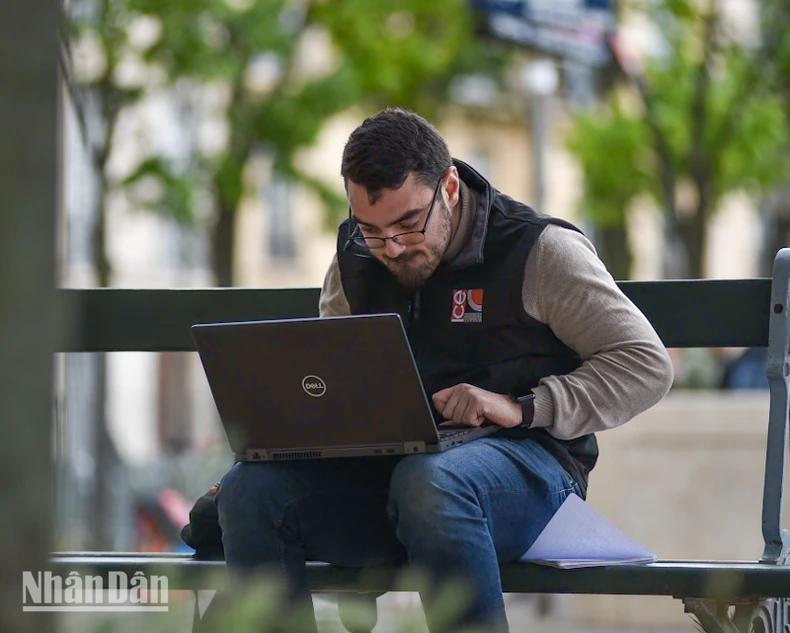
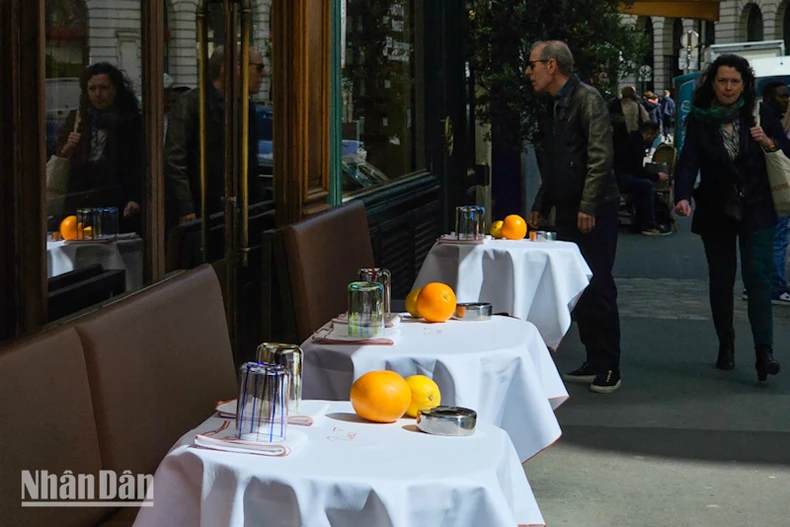
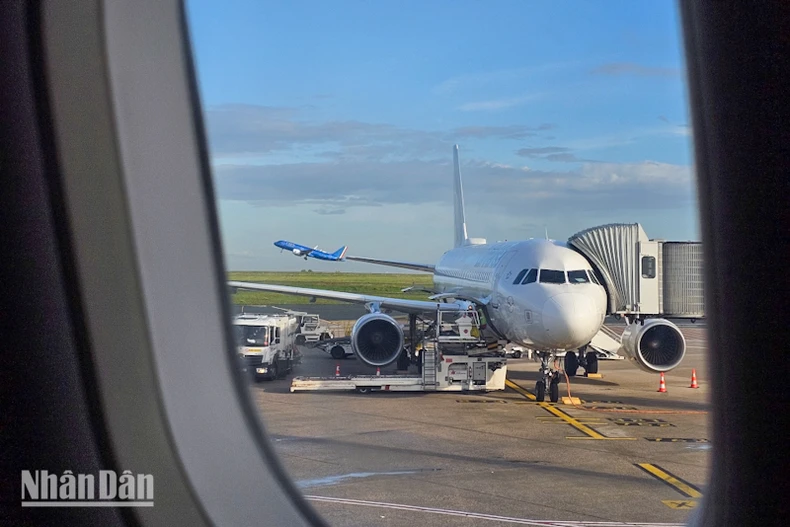
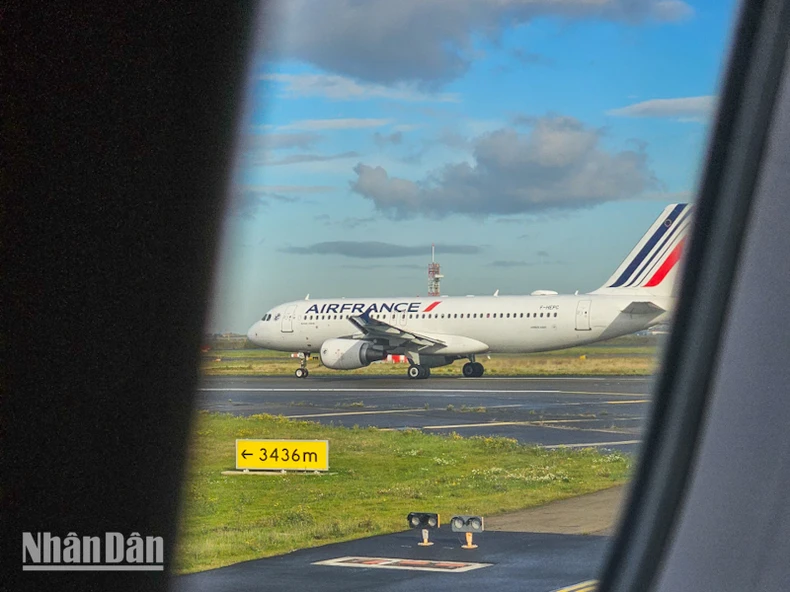
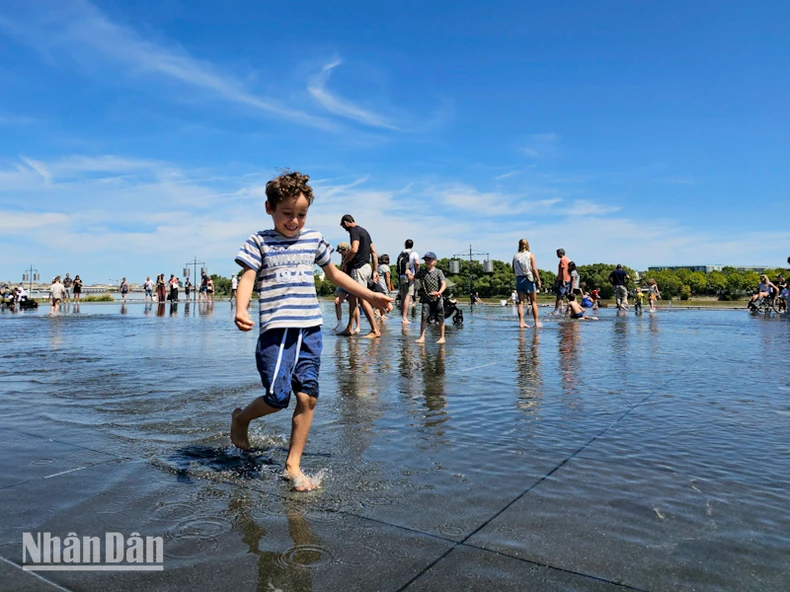
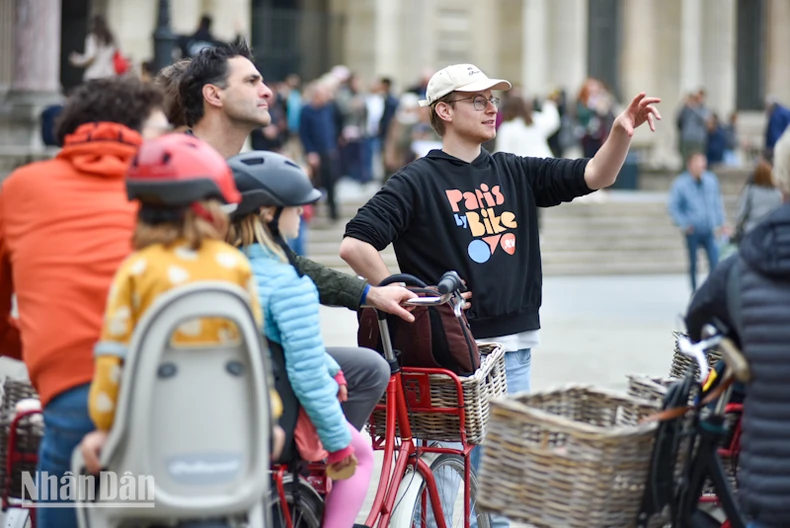
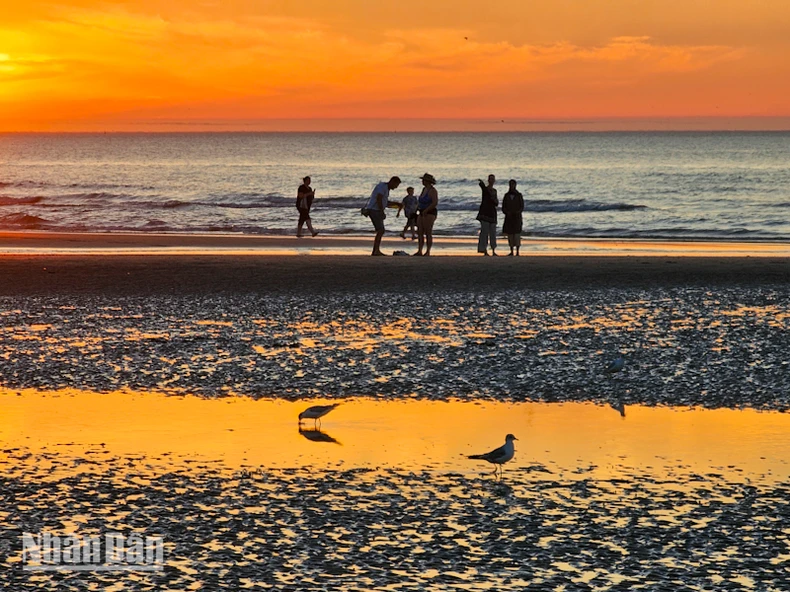
![[Photo] More than 17,000 candidates participate in the 2025 SPT Competency Assessment Test of Hanoi National University of Education](https://vphoto.vietnam.vn/thumb/1200x675/vietnam/resource/IMAGE/2025/5/17/e538d9a1636c407cbb211b314e6303fd)
![[Photo] Readers line up to visit the photo exhibition and receive a special publication commemorating the 135th birthday of President Ho Chi Minh at Nhan Dan Newspaper](https://vphoto.vietnam.vn/thumb/1200x675/vietnam/resource/IMAGE/2025/5/17/85b3197fc6bd43e6a9ee4db15101005b)
![[Photo] Prime Minister Pham Minh Chinh chairs meeting on science and technology development](https://vphoto.vietnam.vn/thumb/1200x675/vietnam/resource/IMAGE/2025/5/17/ae80dd74c384439789b12013c738a045)










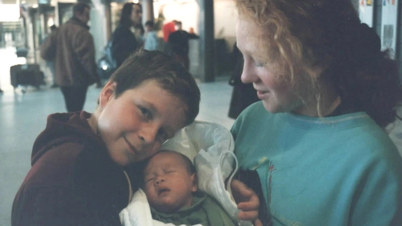



















![[Photo] Nearly 3,000 students moved by stories about soldiers](https://vphoto.vietnam.vn/thumb/1200x675/vietnam/resource/IMAGE/2025/5/17/21da57c8241e42438b423eaa37215e0e)





































































Comment (0)